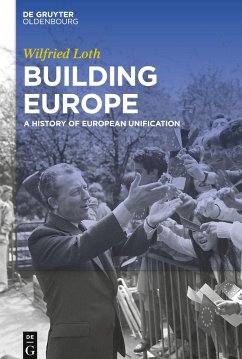Relying on internal sources, Wilfried Loth analyses the birth and subsequent development of the European Union, from the launch of the Council of Europe and the Schuman Declaration until the Euro crisis and the contested European presidential election of Jean-Claude Juncker. This book shines a light on the crises of the European integration, such as the failure of the European Defence Community, De Gaulle’s empty chair policy, or the rejection of the European Constitution in France and the Netherlands, but also highlights the indubitable successes that are the Franco-German reconciliation, the establishment of the European common market, and the establishment of an expanding common currency. What this study accomplishes, for the first time, is to illuminate the driving forces behind the European integration process and how it changed European politics and society.
"An enlightening work. Arequired reading for all who doubt the unfinished history of Europe.” – Rolf Steininger, Frankfurter Allgemeine Zeitung.
"This book will become an indispensable standard work.” – Jörg Himmelreich, Neue Zürcher Zeitung.
Wilfried Loth erzählt die Entstehung und Entwicklung der Europäischen Union auf der Grundlage interner Quellen, von der Lancierung des Europarats und des Schuman-Plans bis zur Euro-Krise und zur umkämpften Wahl von Jean-Claude Juncker zum Präsidenten der Europäischen Kommission. Krisen der europäischen Integration wie das Scheitern der Europäischen Verteidigungsgemeinschaft, die "Krise des leeren Stuhls" in der Ära de Gaulle oder die Ablehnung des Verfassungsvertrags in Frankreich und in den Niederlanden werden ebenso beleuchtet wie unzweifelhafte Erfolge: die deutsch-französische Aussöhnung, die Schaffung eines Gemeinsamen Marktes, die zahlreichen Erweiterungen und die Etablierung einer Gemeinschaftswährung. Auf diese Weise wird zum ersten Mal deutlich, welche Antriebskräfte hinter dem europäischen Integrationsprozess stehen und wie er Politik und Gesellschaft in Europa verändert.
"Ein aufklärerisches Werk. Pflichtlektüre für alle, die an der unvollendeten Geschichte Europas (ver-)zweifeln" - Rolf Steininger, Frankfurter Allgemeine Zeitung.
"Das Buch wird zum unabdingbaren Standardwerk" - Jörg Himmelreich, Neue Zürcher Zeitung.
"An enlightening work. Arequired reading for all who doubt the unfinished history of Europe.” – Rolf Steininger, Frankfurter Allgemeine Zeitung.
"This book will become an indispensable standard work.” – Jörg Himmelreich, Neue Zürcher Zeitung.
Wilfried Loth erzählt die Entstehung und Entwicklung der Europäischen Union auf der Grundlage interner Quellen, von der Lancierung des Europarats und des Schuman-Plans bis zur Euro-Krise und zur umkämpften Wahl von Jean-Claude Juncker zum Präsidenten der Europäischen Kommission. Krisen der europäischen Integration wie das Scheitern der Europäischen Verteidigungsgemeinschaft, die "Krise des leeren Stuhls" in der Ära de Gaulle oder die Ablehnung des Verfassungsvertrags in Frankreich und in den Niederlanden werden ebenso beleuchtet wie unzweifelhafte Erfolge: die deutsch-französische Aussöhnung, die Schaffung eines Gemeinsamen Marktes, die zahlreichen Erweiterungen und die Etablierung einer Gemeinschaftswährung. Auf diese Weise wird zum ersten Mal deutlich, welche Antriebskräfte hinter dem europäischen Integrationsprozess stehen und wie er Politik und Gesellschaft in Europa verändert.
"Ein aufklärerisches Werk. Pflichtlektüre für alle, die an der unvollendeten Geschichte Europas (ver-)zweifeln" - Rolf Steininger, Frankfurter Allgemeine Zeitung.
"Das Buch wird zum unabdingbaren Standardwerk" - Jörg Himmelreich, Neue Zürcher Zeitung.
"Wilfried Loth's volume can be regarded as a relevant contribution to the knowledge of a phenomenon which has shaped the last seventy years of European history and for some time it will certainly be a point of reference to be quoted by the historians who deal not only with the European integration but with the history of contemporary Europe."
Antonio Varsori in: Roundtable Review XVIII (2017) Nr. 31, S. 14
"[...]Building Europe is an excellent, authoritative account of Europe's rise from the ashes after World War Two and its effort at navigating some kind of ever-closer union between nation states in the six decades that followed."
Michael J. Geary in: Roundtable Review XVIII (2017) Nr. 31 S. 11
Antonio Varsori in: Roundtable Review XVIII (2017) Nr. 31, S. 14
"[...]Building Europe is an excellent, authoritative account of Europe's rise from the ashes after World War Two and its effort at navigating some kind of ever-closer union between nation states in the six decades that followed."
Michael J. Geary in: Roundtable Review XVIII (2017) Nr. 31 S. 11








